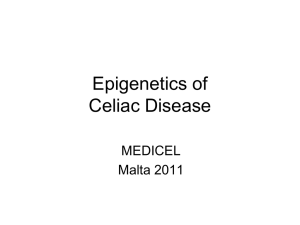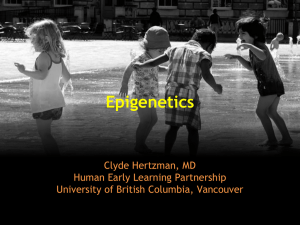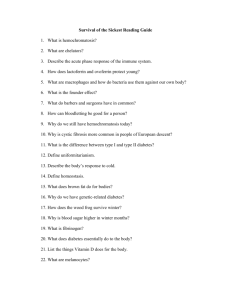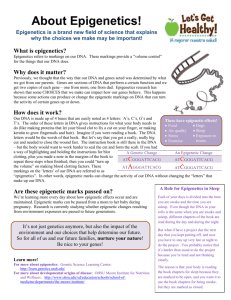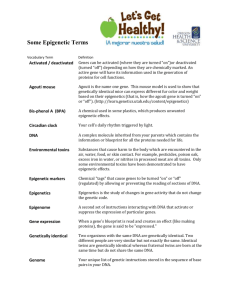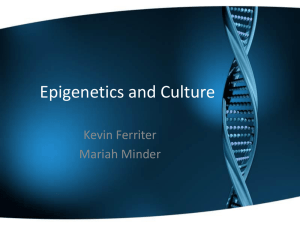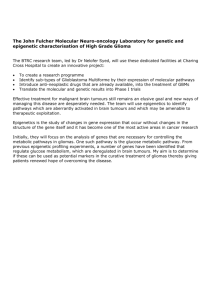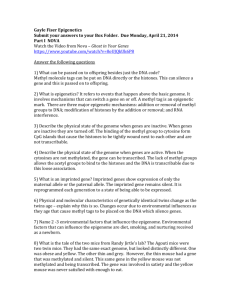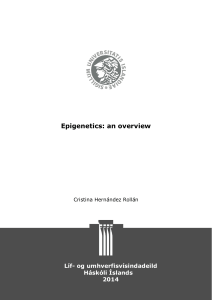Nature vs. Nurture . . . or . . . Genes vs. Environment
advertisement
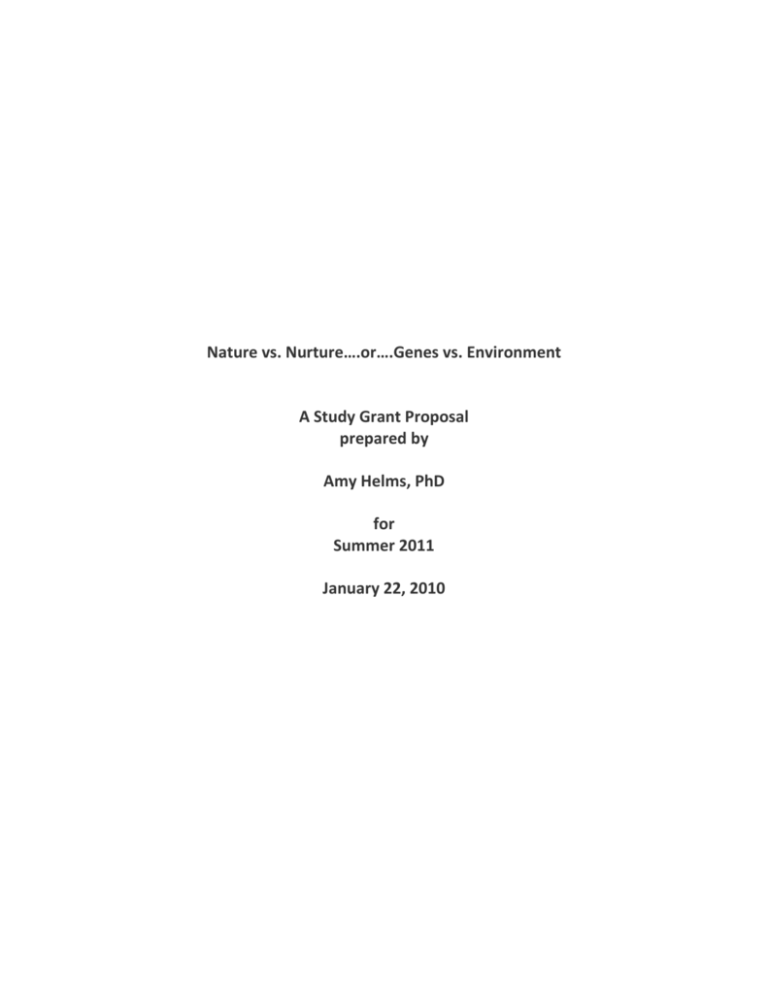
Nature vs. Nurture….or….Genes vs. Environment A Study Grant Proposal prepared by Amy Helms, PhD for Summer 2011 January 22, 2010 Nature vs. Nurture….or….Genes vs. Environment For ages, people have wondered which matters more….nature or nurture. Recent advances in the field of genetics are now allowing us to explore this complex question. The inspiration for this study grant comes from a NOVA special entitled: “Ghost in Your Genes,” which sheds light on the phenomenon of epigenetic inheritance. The prefix “epi” comes from the Greek, meaning “over.” Thus, the term “epigenetics” means “over the genes.” In my opinion, epigenetics is the new frontier of genetics research and probably one the most daunting aspects of the Human Genome Project we have faced yet. In addition to the genes/DNA we inherit from our parents, we can also inherit so-called “epigenetic modifications" that can occur in response to the environment. These "modifications" are not the same as mutations (changes in the DNA sequence) but something "extra" added to the DNA already present. This can affect the activity of the genes...how often they are "expressed" (ON or OFF), or it can affect the amount of expression (LESS or MORE). These data offer a really good theory of how the environment can affect the activity of our genes, by making changes to the regulation of the gene rather than the gene itself. Unlike mutations (which are permanent), these changes can be temporary or permanent. Imagine yourself in your mother's womb. Imagine that whatever environmental influences to which your mother is exposed, you are also exposed. If one of your genes is modified, it affects the activity of the gene and potentially affects your development in the womb. This could also work in the form of having a modification taken off of a gene. Imagine your mother in HER mother's womb (your grandmother). While your mother was developing in the womb, so were her future eggs (and hence 1/2 of the future you). So whatever environmental influences your grandmother was experiencing can also affect the activity of your genes through modifications. Think of how different the environment was when your grandmother was pregnant. For some this could be WWII, for others it was the turn of the 20th century. These modifications can be passed down through generations. So now your genetic makeup includes the actual genes PLUS any changes to those genes during your lifetime. This phenomenon has the potential to explain many of the complex health issues we face today, like diabetes, autism, schizophrenia, etc. Scientists are always looking for "the gene" for some disorder, but if it affects the ACTIVITY of the gene through an outside mechanism they would be barking up the wrong tree. Even more complicated, each person's pattern of modifications (or gene markings) are likely very different and subject to change within their lifetime. If you think sequencing the entire human genome was a complicated project, mapping the epigenome, as it is called, is enormous. I believe this concept to be incredibly important, both in understanding our genetic heritage and in understanding how the environment affects how we look and behave. I would love to have the opportunity to weave this new information into all my classes. I propose to complete my studies on epigenetics during the Summer session of 2011 (Summer I). A detailed study plan is included with this proposal. Weekly Study Plan Many of the sources I have listed are categorized as primary literature. Because this is such a new and evolving field, it is not possible to find many books on this topic. I have categorized my readings as either book or as journal articles. In addition, because of the nature of scientific research, I cannot include the most current sources one year in advance. The sources listed below are examples of what I can find right now in the literature. Prior to beginning my studies, I will search the primary literature again for the most up-to-date research on these topics. Week 1 In the first week of my studies, I will read general reviews on epigenetics and the mechanisms by which genes can be regulated by epigenetic modifications. BOOKS Haslberger, A, and Greler, S. Epigenetics and Human Health: Linking Hereditary, Environmental, and Nutritional Aspects. Wiley-VCH. 2010 Pinter, B. and Meszaros, Z. Epigenetics: Mechanisms, Functions, and Human Effects. Nova Science Pub. 2009. JOURNAL ARTICLES Beck S, Olek A, Walter J. From genomics to epigenomics: a loftier view of life. 1999 Nat Biotechnol. 17(12):1144. Goldberg, A.D., Allis, C.D., and Bernstein, E. Epigenetics: A Landscape Takes Shape. 2007 Cell 128 (4): 635-638. Shi, Y. Taking Epigenetics Center Stage. 2007 Cell 128(4): 639-640 Pfennig, D. and Ledon-Rettig, C. The Flexible Organism. 2009 Science 325: 268-269 Dove, A. Epigenetics: The Final Frontier? 2009 Science 326:303 Week 2 During week two I will focus my studies on the role of DNA methylation in epigenetics. BOOKS Doerfler, W. and Bohm, P. DNA Methylation: Basic Mechanisms. Springer. 2006 JOURNAL ARTICLES Novik KL, Nimmrich I, Genc B, Maier S, Piepenbrock C, Olek A, Beck S. Epigenomics: genome-wide study of methylation phenomena. Curr Issues Mol Biol. 2002 Oct;4(4):11128. Review. Tost, J. DNA methylation: an introduction to the biology and the disease-associated changes of a promising biomarker. 2010 Mol. Biotechnology. 44(1):71-81 Estecio, MR, and Issa, JP Tackling the methylome: recent methodological advances in genome wide methylation profiling. 2009. Genome Medicine 16:1(11):106 Bartholomei, MS. Genomic imprinting: employing and avoiding epigenetic processes. 2009. Genes and Development 23(18):2124-2133 Week 3 During week three I will focus on a second form of epigenetic regulation: chromatin remodeling. BOOKS Turner, B. Chromatin and Gene Regulation: Mechanisms in Epigenetics.Wiley-Blackwell. 2002. Workman, JL. Protein Complexes that Modify Chromatin. Current Topics in Microbiology and Immunology. Springer. 2003. JOURNAL ARTICLES Racki, L.R., Yang, J.G., Naber, N., Partensky, P.D., Acevedo, A., Purcell, T.J. Cooke, R., Cheng, Y. and Narlikar, G.J. The chromatin remodeller ACF acts as a dimeric motor to space nucleosomes. 2009 Nature 462(7276): 1016-1021 MacDonald, JL, and Roskams, AJ. Epigenetic regulation of nervous system development by DNA methylation and histone deacetylation. 2009. Progress in Neurobiology 88(3): 170 Week 4 During week four I will read a variety of papers that discuss the role of these epigenetic mechanisms in a number of different disease processes. BOOKS Church, D. The Genie in Your Genes: Epigenetic Medicine and the New Biology of Intention. Elite Publishing.2007. JOURNAL ARTICLES Ross, SA, and Milner, JA. Epigenetic modulation and cancer: effect of metabolic syndrome? 2007. American Journal of Clinical Nutrition 86 (3): s872-7 Karberg, S. Switching on epigenetic therapy. 2009. Cell. 139(6):1029-31 Ling, C. and Groop, L. Epigenetics: a molecular link between environmental factors and type 2 diabetes. Diabetes 2009 58(12): 2718-25 Chen, J, Odenike, O, and Rowley, JD. Leukemogenesis: more than mutant genes. 2010. Nature Reviews Cancer 10(1): 23-36 Handel,AE, Ebers, GC, and Ramagopalan, SV. Epigenetics: molecular mechanisms and implications for disease. 2009. Trends in Molecular Medicine Ganesan, A. Nolan, L, Crabb, SJ, and Packham G. Epigenetic therapy: histone acetylation, DNA methylation, and anti-cancer drug discovery. Current Cancer Drug Targets. 9(8): 963-81. Weller, M, Stupp, R, Reifenberger, G, Brandes, AA, van den Bent, MJ, Wick, W, and Hegi, ME. MGMT promoter methylation in malignant gliomas: ready for personalized medicine? 2010 Nature Reviews Neurology 6(1): 39-51 Xu, N, Azziz, R, Goodarzi, MO. Epigenetics in polycystic ovary syndrome: A pilot study of global DNA methylation. 2009 Fertility Sterility. Huynh, JL, and Casaccia P. Defining the chromatin landscape in demyelinating disorders. 2009. Neurobiology Disorders. MacDonald, JL, and Roskams, AJ. Epigenetic regulation of nervous system development by DNA methylation and histone deacetylation. 2009. Progress in Neurobiology 88(3): 170 Week 5 In the final week, I will research how nutrition and diet affect gene regulation through epigenetic mechanisms. BOOKS Choi, SW, and Friso, S. Nutrients and Epigenetics. CRC press. 2009. JOURNAL ARTICLES Dolinoy, DC, Weidman, JR, Waterland, RA, and Jirtle, R. Maternal genistein alters coat color and protects Aw mouse offspring from obesity by modifying the fetal epigenome. 2006. Environmental Health Perspectives. Kussmann, M and Affolter, M. Proteomics at the center of nutrigenomics: comprehensive molecular understanding of dietary health effects. 2009 Nutrition 25 (11-12): 1085-93 Vaquero, A. and Reinberg D. Calorie restriction and the exercise of chromatin. 2009 Genes & Development 23(16): 1849-69 Campion J, Milagro, FI, Martinez, JA. Individuality and epigenetics in obesity. 2009 Obesity Reviews 10(4): 383-92 Levin, BE. Epigenetic influences on food intake and physical activity level: review of animal studies. 2008. Obesity (Silver Spring) Suppl. 3:S51-4 Dashwood, RH, and Ho, E.Dietary histone deacetylase inhibitors: from cells to mice to man. 2007 Seminars in Cancer Biology 17(5): 363-9 Kirkland, JB. 2009. Niacin status impacts chromatin structure. Journal of Nutrition 139(12): 2397-401
